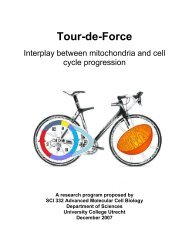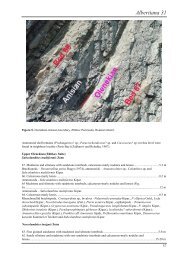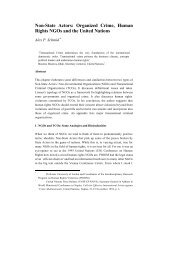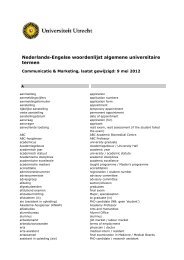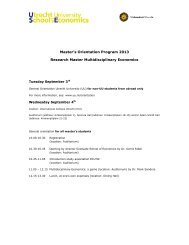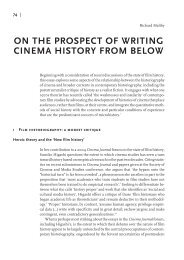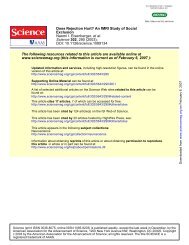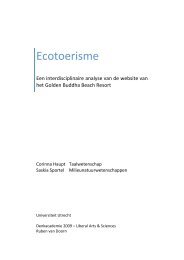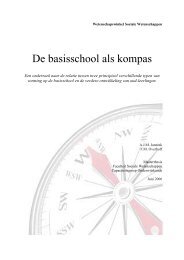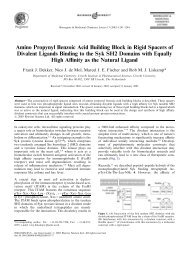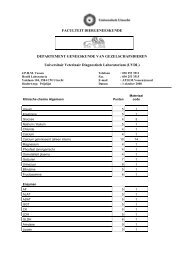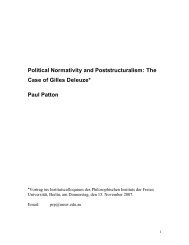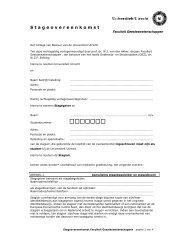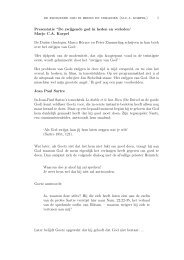Review of the Research Institute for History and - Universiteit Utrecht
Review of the Research Institute for History and - Universiteit Utrecht
Review of the Research Institute for History and - Universiteit Utrecht
You also want an ePaper? Increase the reach of your titles
YUMPU automatically turns print PDFs into web optimized ePapers that Google loves.
A. Documentation regarding <strong>the</strong> level <strong>of</strong> <strong>the</strong> research programme<br />
Title <strong>of</strong> <strong>the</strong> programme:<br />
Cultural Infrastructure <strong>and</strong> Intellectual Culture in <strong>the</strong> Modern Age<br />
Starting date:<br />
1994/2002*<br />
* From 1994 till 2002 <strong>the</strong> programme “Cultural <strong>History</strong>” included what since 2002 is labeled as “Cultural<br />
Infrastructure <strong>and</strong> Intellectual Culture in <strong>the</strong> Modern Age”,<br />
“The Cultural Construction <strong>of</strong> Media” <strong>and</strong> “Arts, Culture <strong>and</strong> <strong>the</strong>ir Contexts”. In 2002 a process was<br />
initiated to split Cultural <strong>History</strong> in <strong>the</strong>se three independent programmes.<br />
<strong>Research</strong> area <strong>and</strong> mission:<br />
<strong>History</strong> <strong>of</strong> Enlightenment, Infrastructure <strong>of</strong> Bourgeois Culture, Intellectual<br />
<strong>History</strong> <strong>and</strong> <strong>History</strong> <strong>of</strong> <strong>the</strong> Sciences<br />
Programme leader:<br />
Pr<strong>of</strong>. W.W. Mijnhardt<br />
Affi liations outside <strong>the</strong> institute (e.g. research school) <strong>and</strong> o<strong>the</strong>r cooperations <strong>and</strong><br />
relations with national <strong>and</strong> international research groups:<br />
Huizinga Instituut: <strong>Research</strong> <strong>Institute</strong> <strong>and</strong> Graduate School <strong>for</strong> Cultural<br />
<strong>History</strong><br />
A 1. Leadership<br />
With its 9,11 fte this is a small group within OGC. It comprises 1 full pr<strong>of</strong>essor,<br />
3 extra-ordinary pr<strong>of</strong>essors, 8 associate pr<strong>of</strong>essors, 5 assistant pr<strong>of</strong>essors, 7 Postdocs<br />
<strong>and</strong> researchers, <strong>and</strong> 4 PhD-students. This programme, coordinated by pr<strong>of</strong>.<br />
Wijn<strong>and</strong> Mijnhardt, seeks to promote excellence in individual scholarship <strong>and</strong><br />
small groups. The programme consists <strong>of</strong> several independent projects, some <strong>of</strong><br />
which combine a number <strong>of</strong> scholars, while o<strong>the</strong>rs work more or less individually<br />
<strong>and</strong> collaborate with o<strong>the</strong>rs on an ad hoc basis. This situation is considered fruitful.<br />
The members <strong>of</strong> this group are affi liated with <strong>the</strong> Huizinga <strong>Institute</strong>, national<br />
research school <strong>for</strong> cultural history.<br />
A 2. Strategy <strong>and</strong> policy<br />
The group includes literary historians, cultural historians, art historians <strong>and</strong> <strong>the</strong>atre<br />
historians. The group values individual ef<strong>for</strong>ts as much as collective work. There<br />
is no overarching programme, <strong>and</strong> <strong>the</strong>re never really was one. None<strong>the</strong>less, <strong>the</strong><br />
group’s work has two clear <strong>and</strong> distinct focal points, with one part <strong>of</strong> <strong>the</strong> group<br />
investigating <strong>the</strong> development <strong>of</strong> <strong>the</strong> scientifi c <strong>and</strong> cultural infrastructure <strong>of</strong> <strong>the</strong><br />
Ne<strong>the</strong>rl<strong>and</strong>s after <strong>the</strong> Middle Ages, whilst o<strong>the</strong>rs are preoccupied with <strong>the</strong> history<br />
<strong>of</strong> Dutch science <strong>and</strong> intellectual culture itself. This research is undertaken in close<br />
cooperation with colleagues outside OGC, in <strong>Utrecht</strong> as well as elsewhere.<br />
For several years, <strong>the</strong> group’s research ef<strong>for</strong>ts were dominated by <strong>the</strong> work on <strong>the</strong><br />
NWO-project “IJkpunt 1800: Nederl<strong>and</strong>se cultuur in Europese context” (Benchmark<br />
1800: Dutch Culture in a European Perspective). The responsibility <strong>for</strong> <strong>the</strong><br />
project was in <strong>the</strong> h<strong>and</strong>s <strong>of</strong> Mijnhardt <strong>and</strong> pr<strong>of</strong>. Joost Kloek.<br />
This project has, to an important extent, shaped <strong>the</strong> current double focus <strong>of</strong> <strong>the</strong><br />
group. Several members <strong>of</strong> <strong>the</strong> group, notably dr Gert-Jan Johannes, dr José de Kruif,<br />
<strong>and</strong> dr Joost Vijselaar (now extra-ordinary pr<strong>of</strong>essor), who all entered <strong>the</strong><br />
programme on temporary contracts through this project, have continued <strong>the</strong>ir<br />
affi liation with OGC.<br />
OGC Cultural Infrastructure <strong>and</strong> Intellectual Culture in <strong>the</strong> Modern Age<br />
68



